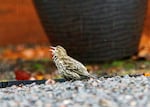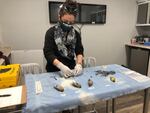
A sick pine siskin is pictured in an undated file photo.
Tim Akimoff / Oregon Department of Fish and Wildlife
A salmonella outbreak is sickening and killing birds in Oregon and elsewhere along the west coast of North America.
Cases of salmonella among pine siskins and other birds in Oregon have trended upwards in recent months, according to the Oregon Department of Fish and Wildlife and wildlife rehabilitators. ODFW urges Oregonians who encounter sick or dead birds to take down bird feeders at least for the next month or two to slow the spread of the disease.
California’s state wildlife agency recently recommended residents temporarily remove bird feeders and baths for the time being. Washington suggested the same in January for people who cannot rigorously clean bird feeders daily.
Salmonella can grow in seed feeders when they get wet, and seed-eating birds like pine siskins then spread it through their poop.
When food resources dwindle in winter, birds often congregate at feeders. These large gatherings can quickly become salmonella superspreader events, which is why wildlife experts are urging backyard bird watchers to take down feeders for now.
“Once there’s an outbreak, it starts spreading pretty rapidly,” said Sally Compton, executive director of the ThinkWild wildlife hospital in Bend.
Cases have been reported as far south as San Francisco and as far north as British Columbia.

Veterinarian Dr. Laura Acevedo performs autopsies on salmonella-infected birds at the ThinkWild animal hospital in Bend, Ore., Feb. 1, 2021.
ThinkWild Central Oregon
Salmonella can spread to humans and pets. Compton said you should wear gloves and remove dead birds if you come across them to avoid contact with other birds or household pets. Immediately wash your hands after.
State and federal wildlife agencies also recommend regularly cleaning and moving bird feeders to prevent outbreaks. They also encourage using feeders from non-porous materials like ceramic, metal and plastic rather than wood, which can harbor bacteria and other diseases.
Bird watchers can keep nectar feeders for hummingbirds out, Compton said, but they also require regular cleaning.
If you encounter a sick bird, you can report it to the Oregon Department of Fish and Wildlife by calling 866-968-2600 or emailing Wildlife.Health@state.or.us.
You can also contact your local wildlife hospital or rehab center. View a list of permitted Oregon facilities here.
